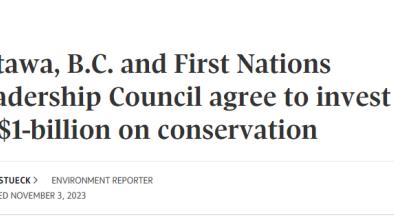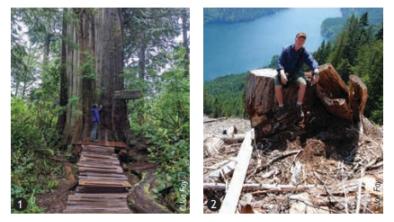As governments boast caribou recovery collaboration, logging continues unabated
Monday, February 19, 2018
VANCOUVER, BC, UNCEDED COAST SALISH TERRITORIES – While the governments of Canada and British Columbia congratulate themselves for a long overdue collaboration with First Nations on the recovery of southern mountain caribou’s central group, logging companies continue to destroy crucial habitat for the threatened herds.
“West Moberly and Saulteau First Nations have rightfully taken matters into their own hands to save southern mountain caribou,” said Wilderness Committee Conservation and Policy Campaigner Charlotte Dawe. “Conservation agreements must be based on traditional knowledge and science, so this collaboration with First Nations for caribou recovery is long overdue.”
These Treaty 8 First Nations have had some of the most successful results in their caribou management plans and have increased the central group’s Klinse-za herd from 16 to 70 animals in just four years.
Concerns remain, however, that the draft conservation agreement is not moving fast enough for the caribou. Southern mountain caribou are listed as threatened under the federal Species at Risk Act, but many herds are on the brink of extinction. There are 23 cut blocks within the critical habitat of the central group, of which fifteen have already been logged and companies have the go-ahead to log eight more. Another eight are pending approval to be logged.
“Governments are consulting and making plans and at the same time logging companies are having a heyday in the critical habitat of the central group – the exact group this conservation agreement is meant to protect,” said Dawe. “If we are serious about protecting these caribou, governments need to enact a moratorium on logging in identified critical habitat until the agreement is done.”
The central group is not the only caribou facing logging threats. There are various herds under threats from active logging, including one near Wells Gray provincial park whose population has been plummeting. On a Wilderness Committee expedition in October we documented active logging in their critical habitat. The central group conservation agreement is going to be used as a guideline for other caribou groups across BC.
“The first draft of the central group agreement didn’t protect the migration range or low elevation habitat of caribou – making recovery of the herd impossible,” Dawe said. “This is why we need provincial endangered species legislation. For now the fate of caribou is left to conservation agreements, which aren’t usually legally binding nor do they hold governments and industry accountable,” Dawe said.
–30–
For more information please conatct:
Charlotte Dawe | Conservation and Policy Campaigner, Wilderness Committee
778-903-3992, charlotte@wildernesscommittee.org
Attached Files

